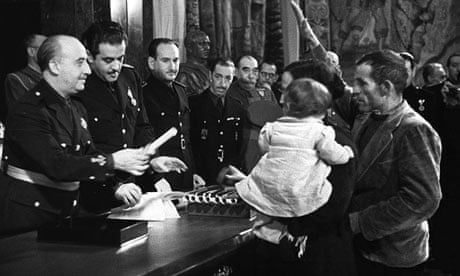Manuela Polo's first six children were born at home in the family's smallholding in the village of Sexe, in the fertile north-western Spanish region of Galicia. So when doctors who delivered her seventh child in a hospital in nearby La Coruña told Manuela that the baby had died shortly after birth, she never fully believed them. Experience told her the baby who had cried and gripped her so powerfully had been born strong and healthy.
Forty-four years later, Manuela, 79, has proof that her instinct was right. On Tuesday her daughter, travelled to Sexe from the eastern region of Valencia, where she was raised as a stolen child with the name María Jesús Cebrián.
"Look at her! Can't you tell she is mine?" exclaimed Manuela. "I never believed you were dead."
"It is a miracle," her son Enrique said by telephone from his barber's shop in nearby As Pontes. "She is just like our other sister Montse, who died a couple of years ago."
Manuela had been told she had a baby boy who had died quickly. Her husband had been shown a tiny coffin that was meant to contain the corpse. This was only the second time campaigners had helped provide proof that babies said to have died at birth had been stolen by a network of doctors, nurses, priests and nuns.
The reunion provided extra weight to demands that a formal inquiry be set up to look into the full extent of baby trafficking networks at hospitals and private clinics which survived well into the 1980s.
Two years ago campaigners began to gather the stories of those who were convinced their babies were stolen during a period when few dared challenge the authority of those wearing a doctor's white coat. As news of the campaign spread, hundreds of adoptive children and mothers who suspected they had been fooled by doctors and nuns joined in.
About 1,500 cases have been registered in Spanish courts, though many have run into bureaucratic barriers, with hospitals claiming they no longer hold the relevant records.
Manuela was one of those who joined the hunt. "She had always told us she thought the child was alive, and she asked us to contact the campaigners," said Enrique. "She had felt the baby's strength and heard its cries."
When a local campaign group in Galicia shared data with another in Valencia, they discovered that the birth date matched that of María Jesús, who had discovered she was adopted when she applied for a Spanish identity card. She asked the courts to help her find her birth mother 12 years ago, but without luck.
DNA tests were done and the match was found to be 99.7%. A second test is due to be carried out to confirm the match. "It is like finding a needle in a haystack," said Enrique. "Not many people have this sort of luck."
A nun who ran an informal adoption agency in Madrid, Sister María Gómez, is among those to have been formally questioned by investigating magistrates over suspected involvement in baby trafficking networks. Single mothers, those with many children and mothers of twins seems to have been especially targeted on the basis that they did not deserve, or need, their babies. One child taken from a single mother by Sister María was told, wrongly, that her mother was a prostitute. Money also often changed hands.
Exhumations carried out in graveyards in the northern Basque country have revealed that at least three families were given empty coffins to bury.
"We will carry on investigating until we find out the truth," said the regional attorney general, Juan Calparsoro.
On Tuesday night Manuela and María Jesús slept under the same roof for the first time in 44 years. "She left this morning," said Enrique. "But we will be meeting again soon."
